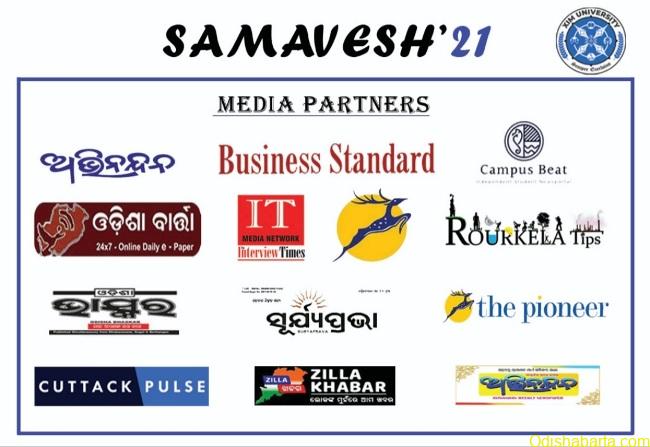SAMAVESH’21 The Annual Urban Conclave

school of human settlements
Bureau,Odishabarta

Bhubaneswar:School of Human Settlements, XIM University (New Campus), Odisha, hosted its annual urban conclave, SAMAVESH’21 on 23rd, 24th, and 25th September, 2021. The theme for the Conclave was ‘Transforming Cities: Striving Towards Resilient Urban Systems.’ The event was brought to us by HabituX- The Student Association of SHS and in collaboration with CAS-SHS. The event started with a welcome note by Dr. Kajri Mishra, Dean, School of Human Settlements, XIM University (New Campus), Odisha. In her welcome note, she addressed the speakers and talked about the importance of collaborative thinking, and how all the bureaucrats, professionals have to work together to tackle the issues. She also addressed that Samavesh has been pooling in disciplinary knowledge by bringing people from various sectors, industries, and eminent academics to talk about what kind of governance and policies are required and ways they have experienced and we can address further. The Introductory speech was given by Prof. Fr. S Antony Raj SJ, Deputy Registrar, XIM University, (New Campus), Odisha. He started his speech by praising how the vision of the school is well associated with the vision of the university in making resilient leaders – which is the need of the hour amidst the covid 19 pandemic and climate change scenarios.He concluded by saying that the system must be made inclusive so that it caters to all sections of the society followed by the inauguration of the Urban Business conclave of School of Human Settlements, Samavesh’ 21. The eminent speakers for the event were:
1. Mr. Subhrajit Ghadei, Strategy and Finance professional and Chairman of GMR group New Delhi, talked about decoding the Liveability Index of Indian Cities and also to implement any project design thinking is the principle. He ended his speech by citing the example of a transformation of Pimpri Chinchwad City and stressed the fact that when one wants to design a solution it should not hamper any other solutions present.
2. Mr. Manas Rath, Founder, and CEO, LEAP Cities, Mumbai, briefed us about the role of the private sector in Urban Management. He illustrated the example of the FSTP in Leh, Ladakh which is a Public-Private Partnership project. He also talked about private sector financing and opportunities for start-ups for private firms in the urban domain. He concluded with the tip to think and utilize spaces in a sustainable resilient way and to analyse and find solutions stating that if the problems are created by us, they also can be solved by us.
3. Mr. Shabaz Khan, Technical Advisor (ICT-A) of GIZ GmbH, enlightened the students on Stormwater management & Urban flooding situation in Bhubaneswar & other cities. He discussed the impacts & Potential of counter flooding measures where he strongly emphasized the participation of the citizens in each step of the process.
4. Mr. Debabrat Patra, Associate Director – ActionAid, briefed the students about how the resilient city can be built up based on People Visions City and to provide basic skills and training so that they can access a wide range of livelihoods.
5. Mr.Arnav Jain, Manager at Deloitte India, emphasized the issues related to water supply in our country. He presented a case study on the water supply network chains of ‘Shimla’. He concluded his speech with the quotation “No water is costlier than no water”.
6. Mr. Rahul Torvi, Strategic Consultant of Cushman & Wakefield, briefed the students about “Democratic Real Estate” and how to make people and the local community a part of the real estate development. He stated that real estate is one of the most illiquid asset classes with a large CAPEX requirement. He concluded his speech with few remarkable statements like “Real estate without Technology is directionless” & ” We should always take up the things in which we can contribute making it from 0 to 100″.
7. Sheikh Muzamil Hussain, an Urban planner at Ernst & Young, briefed the students about factors of urbanization like projected population growth, decadal growth, public transportation shares, etc. to give a vision for futuristic concerns and existing urban transportation scenarios. He presented a case study on the Integrated public transportation plan of Raipur emphasizing its “transformation from Diesel propelled vehicles to electric ones”.
8. Mr. Partha Pratim Nath, Deputy Team leader, IPE Global Limited, India, emphasized the ways to facilitate sustainable mobility. He shared with us the best saying of Brent Toderian, Former Chief Planner, Vancouver Canada which is “The best Transport Plan is a Land Use Plan”. He concluded by emphasising on e-mobility, data and digitalization, route rationalization, and innovative financing mechanism.
9. Mr. Manish Trivedi, Principal Consultant, STEER, India emphasized the major role of “Technology” in a city’s functioning. He threw light on the importance of behavioural study in the city’s making. He concluded his session with a key takeaway for us i.e. “Digital Identity is the key to the lives of the Urban Poor”.
The event was concluded with a Q&A session where the students raised pertinent questions to the panel, making the session interactive and insightful, followed by the vote of thanks to the speakers, faculty members, and everyone who contributed to its smooth functioning and flawless execution.






